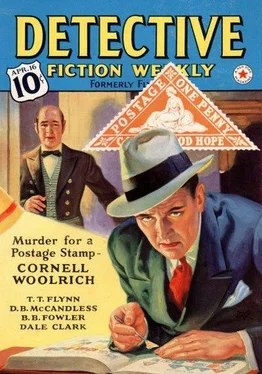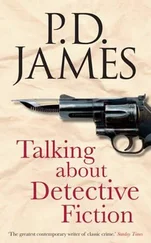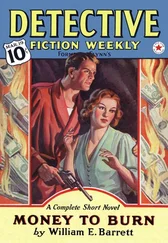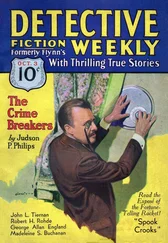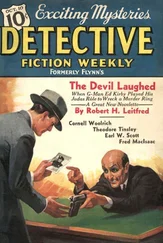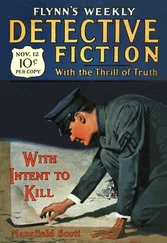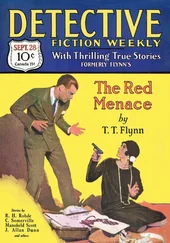Лоуренс Трит - Detective Fiction Weekly. Vol. 118, No. 6, April 16, 1938
Здесь есть возможность читать онлайн «Лоуренс Трит - Detective Fiction Weekly. Vol. 118, No. 6, April 16, 1938» весь текст электронной книги совершенно бесплатно (целиком полную версию без сокращений). В некоторых случаях можно слушать аудио, скачать через торрент в формате fb2 и присутствует краткое содержание. Город: New York, Год выпуска: 1938, Издательство: The Red Star News Company, Жанр: Детектив, на английском языке. Описание произведения, (предисловие) а так же отзывы посетителей доступны на портале библиотеки ЛибКат.
- Название:Detective Fiction Weekly. Vol. 118, No. 6, April 16, 1938
- Автор:
- Издательство:The Red Star News Company
- Жанр:
- Год:1938
- Город:New York
- ISBN:нет данных
- Рейтинг книги:3 / 5. Голосов: 1
-
Избранное:Добавить в избранное
- Отзывы:
-
Ваша оценка:
- 60
- 1
- 2
- 3
- 4
- 5
Detective Fiction Weekly. Vol. 118, No. 6, April 16, 1938: краткое содержание, описание и аннотация
Предлагаем к чтению аннотацию, описание, краткое содержание или предисловие (зависит от того, что написал сам автор книги «Detective Fiction Weekly. Vol. 118, No. 6, April 16, 1938»). Если вы не нашли необходимую информацию о книге — напишите в комментариях, мы постараемся отыскать её.
Detective Fiction Weekly. Vol. 118, No. 6, April 16, 1938 — читать онлайн бесплатно полную книгу (весь текст) целиком
Ниже представлен текст книги, разбитый по страницам. Система сохранения места последней прочитанной страницы, позволяет с удобством читать онлайн бесплатно книгу «Detective Fiction Weekly. Vol. 118, No. 6, April 16, 1938», без необходимости каждый раз заново искать на чём Вы остановились. Поставьте закладку, и сможете в любой момент перейти на страницу, на которой закончили чтение.
Интервал:
Закладка:
Foster, answering their own questions, said, “Why, there’s nothing gone from that page. Every space is filled!”
“That’s just it. Every space is filled,” nodded Hobart. “Gentlemen,” he said slowly, turning to look up at them, “you asked me to come here and help you. I think I can tell you what you want to know without looking any further. On this page, staring up at you from the midst of all its companions, is one of the most valuable stamps in the world.”
“Which one is it?”
“To your eyes one doesn’t look any different than the others,” said Hobart almost scornfuly. “Well, it’s the Cape of Good Hope triangular, this three-sided one right here. Did he own a catalogue? He must have. Let me have it a minute. I’ll show you what Scott’s quotes it at.”
He opened the stamp collector’s bible, which gives the description and current market price of every stamp issued anywhere in the world, and he read aloud: “One hundred and fifty thousand dollars.”
The three detectives nearly fell over. “Are you kidding?” one said. “For that, for that little colored piece of paper?”
“That figure is only hypothetical,” Hobart went on. “That’s what it would bring if it were available. That’s what it brought the last time it changed hands, evidently. As it is, it’s priceless, because there are only three of them known to be in existence. One is in the collection of the late King George, one belonged to the late Czar, I think, and one was in the Farrari collection which was sold at auction behind closed doors in Paris about fifteen years ago. This may be either one of those last two — if it’s genuine and not a fake. There are a number of fakes floating around.” His jaw set in a grim, bitter line. “I know of more than one unsuspecting collector who has been stung with them by unscrupulous fly-by-night dealers, who rented an entire establishment for a ‘front,’ filled it with dummy stock, just for the sake of making this one larcenous transaction, then vanished in time to escape prosecution.”
“Well, which is that one, the McCoy or a counterfeit? Can you tell?” Foster asked eagerly.
“No, I can’t,” said Hobart irritably, as though the sight of such a treasure had made him discontented. “Not just looking at it with the naked eye, or through a glass either. It needs a watermark detector.” He stopped their torrent of further questions with an impatient lift of his hand. “From your point of view its continued presence in the album can mean only one thing. That the stamps played no part in the murder, their theft wasn’t the motive, and the murderer was not a stamp collector. You can bet your lives he wasn’t! He certainly wouldn’t have left that fabulous thing undisturbed if it had been.”
To his surprise, he could see that Foster appeared unwilling to accept this conclusion. The detective walked away, lit a cigarette, turned, and stood looking back — part of an unconscious third-degree technique.
“Unless,” Foster suggested, “it really is a fake, and he only saw that after he croaked the old guy, and then didn’t bother taking it after all.”
“He couldn’t tell by just looking at it,” Hobart insisted stubbornly. “I don’t care who he was. If I can’t, he couldn’t have, either! He’d have had to take it out and put it in a watermark detector before he could make sure, and it hasn’t been taken out of the album.”
Foster wouldn’t give in either. “Fair enough as far as it goes,” he said skeptically, “but you’re not using psychology, and that brings us back onto my ground again. Look at it this way. If there are only three of them as you say, how can anyone taking it possibly hope to get rid of it afterward — unload it without creating an uproar in stamp circles? Don’t you see? It’s too rare, too easily identifiable. It’d be like heisting the Venus de Milo or the Hope diamond. He was no fool, whoever he was. Don’t you think it’s likely he realized, at sight, that this thing would be a white elephant? Isn’t it possible he purposely left it there because its possession would have branded him, and instead helped himself to a lot of less unique, but still worthwhile, stamps from other parts of the collection? Stamps whose ownership would be harder to trace, stamps that would bring him plenty of money without the risk of detection? I don’t think you’ve given us our answer yet. Not until you’ve gone over that collection from A to Z and told us definitely whether anything is missing from it.”
Hobart nodded reluctantly, but he seemed to be thinking of something else. He kept chewing his lower lip. “That’ll take days,” he said unwillingly. And one of the other detectives remonstrated with Foster. “Don’t forget, Frank, Mr. Hobart isn’t on the city payroll. After all, he’s given you his opinion.”
“Well, I don’t want to impose, but we’re absolutely dependent on you for our clues in this.” Foster appealed to the stamp expert.
Hobart glanced once more at the tiny pyramid-shaped piece of paper lying there on the page. He seemed to make up his mind abruptly, as though the stamp had exerted some sort of magnetism on him.
“I’ll do it,” he said. He drew his chair in again. “I’ll start in alphabetically and work my way through the albums country by country. That’s the only way.” He pointed to the catalogue. “Do you see those little pencil-checks next to a great many of the listings? That means he had those items. That’s the way most collectors keep a record of what they own. I do it myself. It’s simply a routine matter of verifying the catalogue-checks by what’s in the album.”
“Oh, well, if that’s all there is to it, one of us could do it. There’s no reason why you should,” Foster suggested penitently.
Hesitantly though he had been before, Hobart now seemed anxious for the chore. “I can do it about three times as quickly, though, because I’m familiar with the stamps at sight. You people would have to pore over the color of each one, and the face value, and the date of issue and all that; I can identify at a glance. Besides, it’s no tiresome task. I’ll enjoy it even though they’re somebody else’s stamps. It’s my hobby. I think I can work over the whole collection in about two sittings.”
He took off his coat, polished up the magnifying glass, and got busy. They watched him fascinatedly for a few minutes, but the novelty quickly wore off. All he did was simply go down the line of pencil-checks in the catalogue with one tracing finger, and with his other hand keep swiveling a pencil back and forth between catalog and album, occasionally bringing the glass into play to inspect something more closely. That was all there was to see. Their interest quickly waned, and after all they had their own work to attend to. After a series of hoasely-whispered consultations — they were like schoolboys in the presence of a headmaster, who must not be disturbed — they went out one by one, metaphorically on tiptoe, if not literally. Foster, the last to leave the room, said: “Tell you what. You holler if you come across anything missing. I got a little more questioning to do upstairs.”
Hobart simply nodded abstractedly, without looking up. Yet if he seemed oblivious of the fact that he had been left quite alone in the room, that was a misleading impression; he was acutely conscious of it, with every nerve in his body.
“Fools,” he thought savagely, continuing to pore over the tabletop, “leaving a stamp collector, I don’t care who he is, alone and unwatched with the Cape triangular! After I told them what it’s worth!” it was, he realized vaguely, because they didn’t quite believe him. That is, consciously they did, but unconsciously they didn’t. It still had no meaning to them. It was just a triangle of colored paper no matter what he said about it. If it had been jewelry or something their minds were trained to think of as intrinsically valuable...
Читать дальшеИнтервал:
Закладка:
Похожие книги на «Detective Fiction Weekly. Vol. 118, No. 6, April 16, 1938»
Представляем Вашему вниманию похожие книги на «Detective Fiction Weekly. Vol. 118, No. 6, April 16, 1938» списком для выбора. Мы отобрали схожую по названию и смыслу литературу в надежде предоставить читателям больше вариантов отыскать новые, интересные, ещё непрочитанные произведения.
Обсуждение, отзывы о книге «Detective Fiction Weekly. Vol. 118, No. 6, April 16, 1938» и просто собственные мнения читателей. Оставьте ваши комментарии, напишите, что Вы думаете о произведении, его смысле или главных героях. Укажите что конкретно понравилось, а что нет, и почему Вы так считаете.
